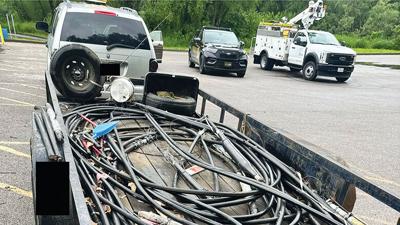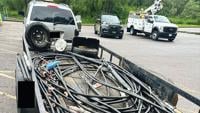Telecommunication wire thefts in Jefferson County have become more frequent and brazen, according to local law enforcement officials.
Kane Harris, a Jefferson County Sheriff’s Office detective, said one of the 56 wire thefts so far this year occurred while a damaged line was being repaired.
“One of the workers was in the air working on the line, and a car stopped and someone stole the wire off the ground while he (the worker) was in the bucket,” Harris said.
Thieves poach the wire for the copper, which may sell for up to $3.60 per pound, according to reliablerecyclingcenter.com.
“Copper prices have gone up. It is the same way we saw catalytic converter thefts happening several years ago,” Sheriff’s Office Capt. Matt Moore said. “We have seen some legislative changes that helped curb catalytic converter theft. Thieves have changed their strategies. They see the price of copper rising. They see wires hanging that contain copper, and it is a quick hit for them.”
According to a telecom industry report, the cost to replace cut wire ranges from $5,000 to $10,000 per incident, and wire thefts have cost providers and customers millions of dollars.
The Sheriff’s Office reported that it cost an estimated $177,000 to repair the wire stolen during the 56 thefts this year through July 9.
“There is a significant cost associated with these thefts,” said Derek Tolliver, AT&T Global Security Investigations lead investigator. “(The repair costs) vary greatly between each incident.”
Tolliver and Monte Miller, Spectrum Midwest communications manager, said telecommunications providers are working with lawmakers and federal, state and local authorities around the country to curb wire theft.
Miller said Spectrum offers a reward of up to $25,000 for information that leads to the arrest of anyone who vandalizes its infrastructure. Those with information may call Spectrum at 833-404-8477.
AT&T has a hotline for people to report thefts, 1-800-807-4205, and the Sheriff’s Office may be called at 636-797-5515.
“We encourage everyone, that if you see something suspicious, to please report it to law enforcement or call the AT&T hotline,” Tolliver said. “The Jefferson County Sheriff’s Office and Arnold Police Department have done a phenomenal job of investigating these crimes and have dedicated a lot of time and effort toward mitigating additional thefts in the county. We appreciate how much work they have done.”
On the rise
Moore said Jefferson County began seeing a rise in the number of wire thefts in 2021, when the Sheriff’s Office recorded 45 incidents.
He said that number dipped over the next two years, with 40 in 2022 and 26 in 2023, but the incidents skyrocketed to 91 in 2024
“We are on track to meet or exceed last year’s total.” Moore said of 2025.
According to a report from the Internet and Television Association, Missouri had 305 incidents of theft and vandalism against broadband communication lines from June through December last year.
That was the third highest total nationally, behind 1,805 incidents in California and 1,113 in Texas, the report said.
A total of 5,770 incidents of theft of vandalism were reported from June through December 2024 nationwide, averaging 824 incidents per month and 27 incidents per day, according to the report.
Tolliver said wire thefts have increased due to several factors.
“The increase in the price of copper has driven this to surface more than in the past,” he said. “The recycling centers are accepting this material when they shouldn’t be, and AT&T has a lot of telephone cables, so the accessibility is a factor in this process as well.”
Getting the wire
Harris said the methods for stealing wire vary.
He said some thieves use ladders, which are often left behind. Investigators also have found 2-by-4s screwed into utility poles to create makeshift ladders, as well as makeshift pole saws made with a chainsaw attached to one end of a pole to cut down wires that often hang about 20 feet off the ground.
Harris said thieves also target sites where wire is buried and dig it up and cut it at ground level.
“They are doing it so often with so many different methods to get the wire,” he said.
Tolliver said some of the wire thieves steal doesn’t have value. For example, some thieves cut fiber optic wire, which has no copper, either thinking it contains copper or cutting it to get to other wire that contains copper.
“The fiber optic has no value to them,” he said. “They usually just leave the fiber wire on scene and take the copper material they are targeting. They are interrupting and cutting down several different lines for AT&T and other utility services for fiber that has no value in it.”
Disruptions
Tolliver said while the economic toll to repair and replace stolen wire is steep, AT&T’s main focus is public safety and ensuring customers have a reliable network.
“When they cut down cable, they disrupt network operations and impact service for a particular area,” he said. “They are creating issues for residents, businesses, law enforcement and emergency services, which causes a public safety concern for a community.”
Harris said network interruptions can be dangerous.
“If you take a situation where you have someone who may be elderly, a slip and fall could end up being fatal if they don’t have a means of communication,” he said. “It also interrupts services such as life alert. If they are relying on life alert, which primarily uses the internet to send signals, that could cause severe issues.”
Harris said thieves often steal wire from the same location multiple times, leading to frequent network disruptions in a particular area, and if wire is cut from multiple locations in the same area, it may take longer for companies to repair the damage.
He also said repairs may be delayed if wire is stolen from remote locations or during inclement weather.
“(Telecommunication companies) are not able to get communication lines out for sometimes upward of two weeks because they keep hitting the same spot,” Harris said. “That could be fatal for some people.”
Combating thefts
Moore said it is rare for law enforcement to catch the vandals while they are committing a crime, and Harris said wire typically is stolen in remote locations with little traffic, making it difficult to curb vandalism and theft.
However, the Sheriff’s Office has had some success identifying, arresting and getting charges filed against the thieves.
In April, Joe Louis Barton III, 51, of Hematite and Troy W. Richburg, 61, of the Festus area were charged for allegedly stealing AT&T telecommunication wire south of Festus. The stealing charge is a class D felony punishable by up to seven years in prison.
The two were identified and later arrested after Harris set up a trail camera to monitor wire that had been left behind after it was cut from utility poles near Hwy. CC. Barton and Richburg were seen near the wire and were later arrested, according to the probable-cause statement in the case.
“We use technology to our favor,” Moore said. “It can be cameras, digital data we can follow up on and partnerships with our scrapyards because this wire is ending up somewhere.”
Miller said Missouri is one of 28 states where telecommunication wire theft is a felony. Suspected thieves are typically charged with a class D felony, but the charge may be raised to a class C felony, which is punishable by three to 10 years in prison, if the value of the stolen wire is more than $25,000, according to state statute.
The stiff penalties; cooperation of scrapyards to record who sells them copper; partnerships between law enforcement departments and telecommunication companies; and assistance from the public will help curb the thefts, Moore said.
“We ask the public to keep their eye out for people who appear suspicious or who are tampering with utility lines,” he said. “We ask they call us if something draws their attention.”




